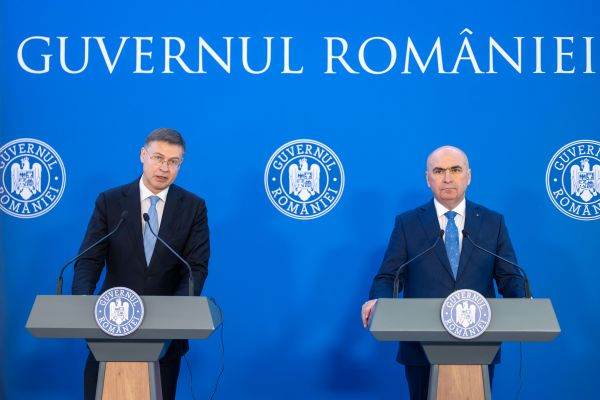Prime Minister Ilie Bolojan announced yesterday that the Government will finalize next month a new package of fiscal measures and reforms to reduce the budget deficit, with the clear aim of demonstrating to the European Commission that our country is capable of correcting its fiscal imbalances and avoiding the suspension of community funds.
"November and December will be decisive for the 2026 budget. In December, we should have the state budget law for next year ready, with the deficit target, and in November it is necessary to adopt a package of measures," Ilie Bolojan said yesterday, emphasizing that the government's direction is one of "fiscal discipline and prudence in spending."
According to the Head of Government, the budget deficit target for 2026 is set at 6% of GDP, a threshold considered "realistic, but ambitious", given that for the current year the Executive estimates a deficit of 8.4% of GDP. This significant decline requires firm measures, which, according to Prime Minister Ilie Bolojan, will aim to "reduce spending, prioritize and stagger investments and increase budget revenues”. The strategy, he said, has a dual role: to ensure macroeconomic stability and maintain Romania's credibility on international financial markets. "We want to maintain the ability to access markets and maintain economic stability”, stressed Prime Minister Ilie Bolojan.
The Head of Government's statements were made at a joint press conference with Valdis Dombrovskis, the European Commissioner for Economy, an event that took place at Victoria Palace. During the event, the European official said that November will be the month in which Brussels will decide whether Romania's efforts are sufficient to stop the procedure for suspending European funds.
"The European Commission will decide in November whether the measures to reduce the budget deficit are sufficient to stop the process of suspending European funds,” said Valdis Dombrovskis, who added: "Taking into account the reports of the Romanian authorities and the measures taken in recent months, the Commission will determine whether Romania can meet the European fiscal requirements regarding the excessive fiscal deficit procedure by the end of November. If the Commission's assessment is positive, this will allow to stop the macroeconomic conditionality process and avoid the suspension of European funds.”
The European official praised the efforts of the Romanian government, noting that "we have worked closely with the Romanian Government and authorities over the past month, in particular with the Prime Minister and the Minister of Finance, to address these urgent issues and that is why I want to thank them for their close collaboration.” At the same time, the European Commissioner warned that "the scope and nature of the measures taken correspond to the efforts to bring Romania back in line with what is needed, but we still expect the budget deficit to be 8.4% and it is important to maintain a solid framework, meaning that the deficit target for 2026 must be respected in order to ensure financial stability and to correct the excessive deficit by 2030, as planned".
In this context, November becomes a true test of economic and political maturity. The agenda of the EU Council, in ECOFIN format, will include a detailed assessment of how Romania has managed the excessive deficit procedure, and the European Commission's decision will directly influence the flows of European money.
For Romania, this moment is not just an administrative formality, but a crucial stage in which government responsibility and consistency in reforms must be proven. In a European context marked by instability and inflationary pressures, the country's ability to remain eligible for European funds depends on the delicate balance between austerity and development.














































